15th October 2025
Twelve gamers made it past the St Ives carnival outside to join us for six different games.
A few Lacerda’s had been touted beforehand on Discord and Steph had offered Lisboa, so Iain, Darren and Dan joined the table on the night to help rebuild the city after the earthquake of 1755. The city had been reduced to rubble by the earthquake, the ensuing tsunami and various fires, and in the aftermath King Jose I tasked the Marques of Pombal to rebuild the city, with the help of architect and engineer Manuel da Maia. Players take on the role of noble families aiding in the rebuilding project by clearing rubble, opening public buildings and creating new areas of commerce, among other activities. All to earn those most fancy of victory points – wigs!
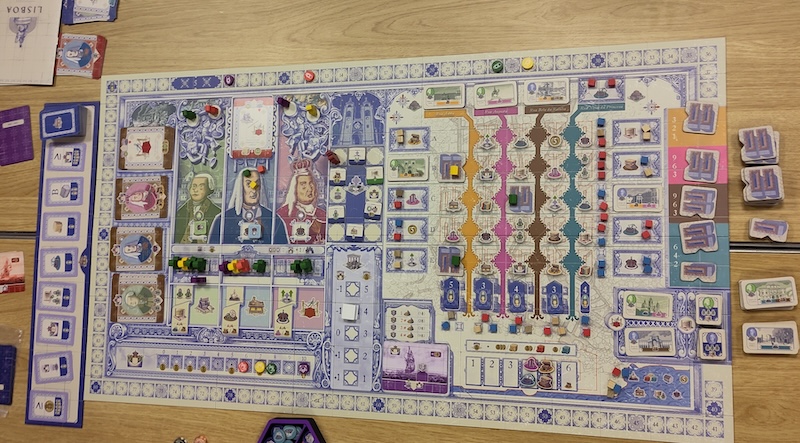
The main board shows a map of Lisboa in a grid, with rubble surrounding it (your standard earth rubble, that tricksy to hold-on-to water rubble, and the burny-burny fire rubble), and the Noble’s offices, presided over by the architect, the Marques and the King. Rubble has different costs associated with it, and cross-referencing the rubble with the location you want to build a shop in tells you the cost – minus one piece of rubble which you clear away to your player board. Collecting sets of the 3 rubble types opens more space in your portfolio to play cards – noble cards to gain influence, treasury cards to gain effects such as discounts, and ships to which can be sold goods and will also gain you influence. A ship with an empty hold will accept goods from all players, gaining the seller money and the ship-owner wigs.
Building locations are on streets which have been zoned for a particular good (cloth, tools, gold and most valuable of all, books – that’s my valuation, not the games), and are scored by way of opening the public buildings that surround the city centre, in line with the locations. All well and good, but the key to doing any of these things is to use your officials to lobby at the noble’s offices, and the more officials other players have in each office the more expensive it is to make yourself heard over the bedlam of bureaucracy. And of course, there’s a cardinal wandering around setting things off at certain points.
Videos had been watched beforehand, but Steph took everyone through the actions and iconography so that it at least felt like we knew what we were doing. The first few actions were very much a case of “I want to do this, how do I get there Steph?”, but it soon came together. Kind of. If we’re being kind. A few goods were sold, a few favours earned, a couple of ships were purchased, and the King was even persuaded to open a public building or two. And shops were then opened … oh, hang on, how much? Next turn then. Money seemed to be tight, but Darren had a hefty purse from some canny trading. But then he discovered that meant everything else was tight. Lots of things to balance when you’re rebuilding a city it seems. Fun was also afoot with the favours – each of the presiding nobles had a colour associated with them, and apart from controlling certain aspects of the rebuilding (the architect looking at building shops, the Marques providing decrees for end game wigs, the King opening public buildings) and allowing you to take the various other actions in the game, they can also grant favours in their colour. If another player seeks an audience with a noble and you happen to have a favour from that particular noble, you can hang onto the other player’s coat-tails and take some of the associated actions yourself, out of turn order. Figuring out how this can best be used adds another layer into the fun.
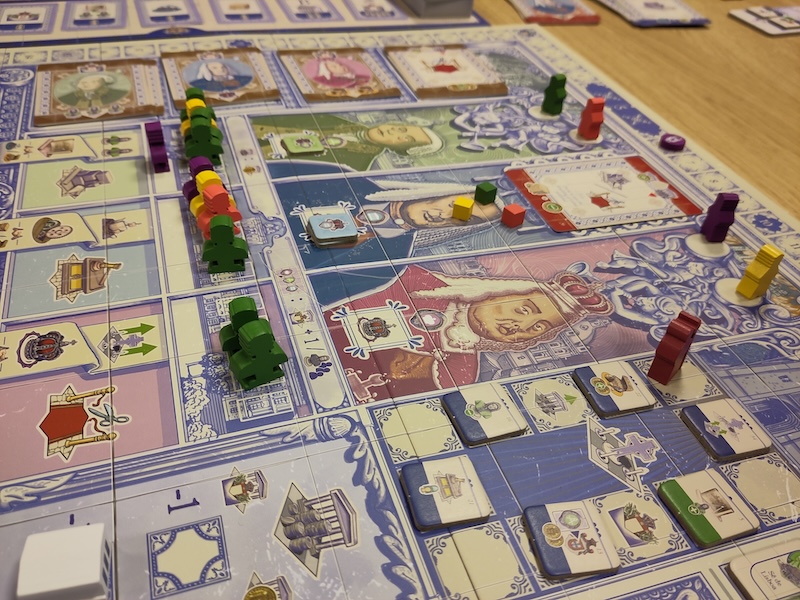
Just as the decks of cards were slimming down to trigger the end of game, Steph’s rubble clearance house was also reaching end game trigger point – 4 full sets of 3 types. A final round was played out and then the wig counting began. It was fairly obvious Steph’s collection of hairpieces was head and shoulders above the rest, but as wigs were counted Dan and Darren were leapfrogging each other until Dan came out 1 wig ahead, with Iain waving wigs a short way behind. A fun learning game with plenty to think on, and an eagerness to play again.
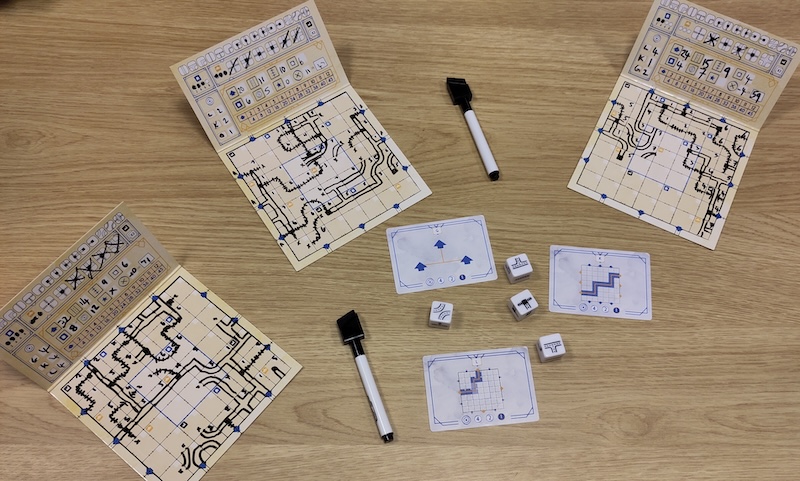
Railroad Ink, played a lot on the COVID induced BGA sessions, but first time in hardcopy format at club and the Shining yellow edition although the special dice with deserts and canyons were not used this time as people refamiliarised themselves with the rules without a computer doing it for them. Dice were rolled, roads and rails were added and rubbed out again, eventually decisions were made and locked in then regretted when the next round of dice were revealed. Jeremy eventually won with the best connected networks and after this rules refresher we might do better next time.
Kingdomino was also played on another table - a frequent mini kingdom building game at the club to fill in time between games or gamers arriving. When everyone had arrived the short gamers split across two tables for Ra and Above and Below.
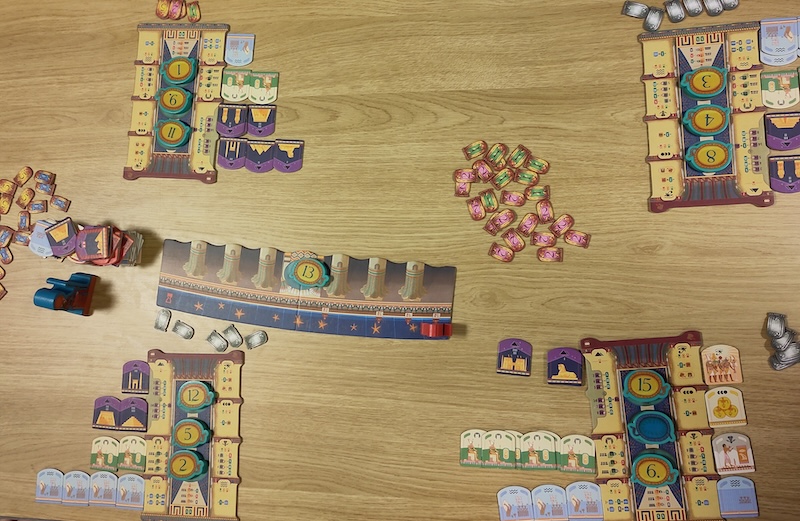
Ra was on it’s third club play, first tried in session 63. Essentially a game of auctions and pushing your luck or holding your nerve. We had a very nice version with luxury large wooden counters and a large Ra for banging on the table and shouting “Ra!” in order to start an auction. Played over three eras each player can only win three auctions per era, they have balanced betting chips at the start of the game and as tiles are drawn out of the bag the longer you wait the more build up and the more points they may score, but also some disaster tiles might appear and make the run less attractive. The winner of the auction swaps their winning betting chip for the one from the last auction, which may be higher or lower in value. This means whatever chips you have acquired from auctions in that era is what you have to make the best of in the next, so sometimes it can be worth grabbing a high point chip and a few tiles. Monuments and Rivers were a big deciding factor in the final scores with Dave having an impressive set of stone masonry and Kathy a nice long section of the Nile, but Richie and Simon had been fighting for the highest end game total auction chips score and the most pharaohs, so in the end the scores were quite close.
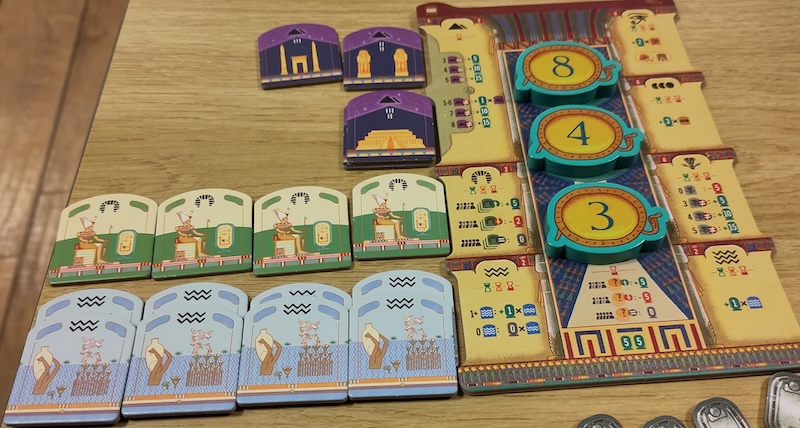
Once Ra had finished there was some time for Scout a whist based card game with a circus theme played at club four times before, first seen in session 65. The rounds were unusually ending rapidly catching some players out with unused cards and lots of negative points. In the final round the cause became clear when when one player asked for “more time to rearrange their hand”, at which point cries of “You can’t rearrange your hand that’s the whole point of the game” rang out and the amazing run of luck playing large flushes or straights in the previous rounds was explained. So it was unclear who was the best circus ringmaster.
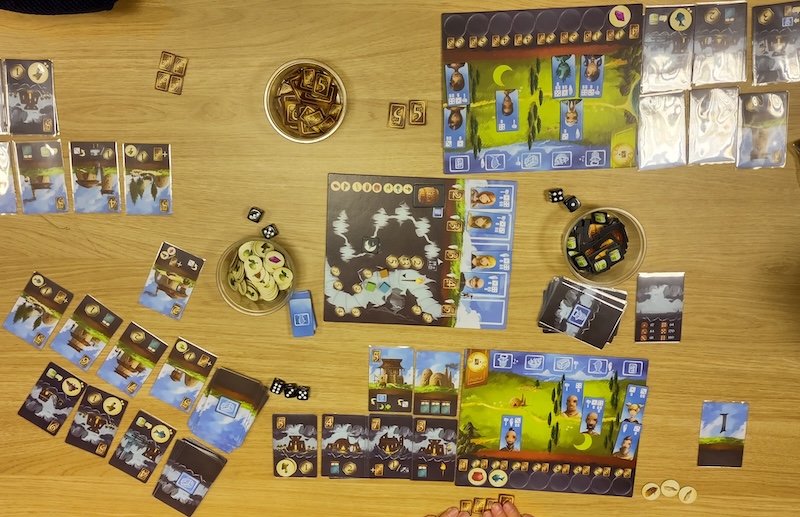
Above and Below was back at the club, last seen in session 66. This is a game about building, exploring and harvesting (or resource juggling to some degree). You can build different types of building above ground, and below ground as long as you have explored successfully. If you go exploring, you need at least two villagers and then a random paragraph is read from the exploration book where you have options that need a certain number of successful lanterns based on the villagers you take. Resources can be collected on exploring (ill gotten or received for good actions) or harvesting at buildings (such as a mushroom farm or a fruit orchard), you can then use these resources on your resource track to increase your income per round or your end game score.
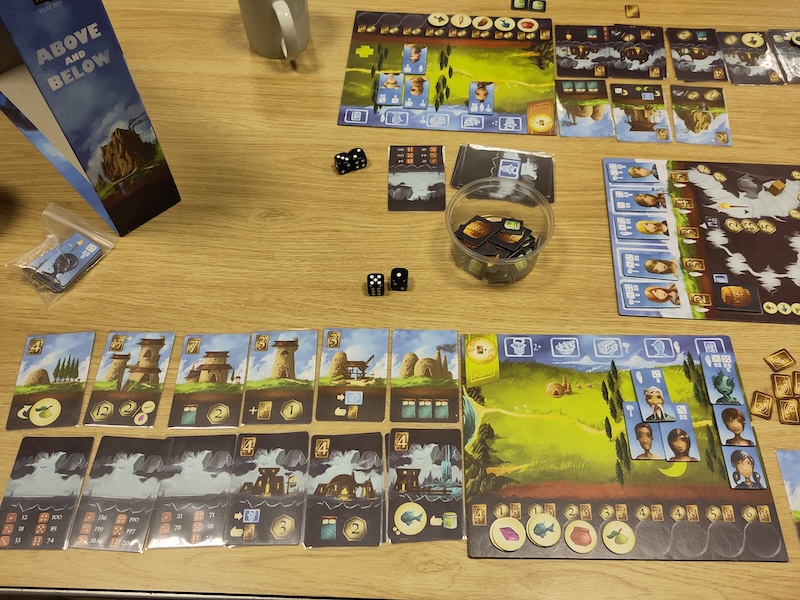
This session saw Jeremy, Paul and Neil competing to build the best town. The game starts off slowly as you build up enough villagers and income, but Paul got a nice fishing spot that replenished every round, Neil got a special building that allowed new recruits to join ready for action, and Jeremy got buildings with extra income to balance out the fact he couldn’t find any resources to improve it! Everybody got in to the swing of sending out villagers to explore, though the returns can be rather random. Paul on one trip managed to find a lady trapped down a pit, he was worried it was a witch, but rescued her anyway and was showered with gold and prestige. Neil managed to find a broken mechanical man and had ventured out with two village builders giving him a bonus to helping him, but unfortunately the rolls for lanterns went poorly he couldn’t fix him and had to leave empty handed. Jeremy had a few fretful adventures as well, one was in a thermal pool of monsters that wanted to eat the tasty villagers, where running away was the only sensible option and so lost 2 golds worth of possessions!
After a fun game of exploring and building, Jeremy and Paul tied on 48 points, but Neil had a successful final adventure netting him some more resources that allowed him to win with 54 points.
The next session is the 29th October, as always suggest games you would like to play in advance or just turn up and see what is on offer.
- Total Session Attendance: 12
-
Board Games: 6